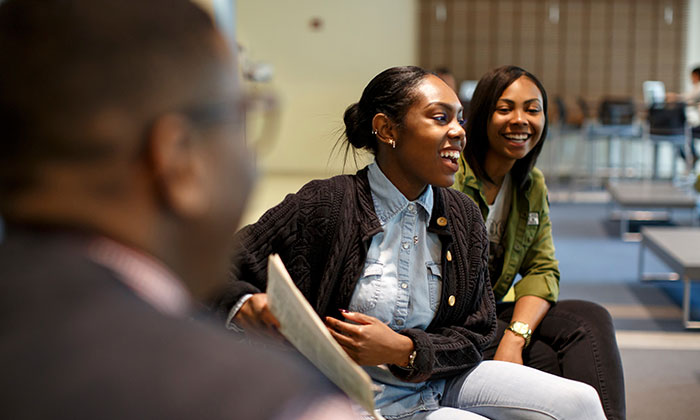The transition into college can be nerve-wracking. During the application process, you’re asked to produce a résumé, essays and recommendations exhibiting your best self. Once enrolled, you’re expected to take a challenging course load, earn good grades and have a high GPA. Let’s not forget those extracurricular activities or jobs that you probably have a commitment to as well. And somehow, you’re supposed to stand out to an admissions panel amongst many other qualified students.
The pressure is real. So how are you going to differentiate yourself from the other people in your class who are applying to the same schools as you? How can you be better than them? Where do you fall short where they excel? It’s easy for students to compare themselves to their peers during the college application process. Although students need to submit an application that sets themselves apart from their peers, there comes a point where it isn’t good for students to compare themselves to one another. Here are a few reasons why comparing yourself to other students can be detrimental to your college success.
1. Comparisons often don’t measure up next to each other.
You’ve heard the saying ‘it’s all relative,’ right? On that note, you should understand that there aren’t a set of standards in making comparisons, which can cause people to compare unequal things to one another, setting them up for failure from the start. For example, another student may have a higher GPA than you, but you might take more rigorous courses than that student. Therefore, since you don’t take the same courses, you can’t necessarily compare your GPA to that student’s GPA.
What you should do instead — set goals for yourself, and focus on achieving those goals. Don’t worry about what the person next to you is doing. Go at your own pace and focus on what you love and how you can become a better learner and a better person. After all, your undergraduate education is for your future, not your neighbor’s.
2. You can overlook your good qualities when you compare yourself to others.
Constantly comparing yourself to others takes away your peace of mind and happiness. You’ll tend to focus on making yourself look better over other students, rather than on what already makes you shine. You’ll sit there wondering how you can add Photoshop proficiency to your résumé because your classmate is a graphic designer, even though you’re pursuing accounting and are a whiz at crunching numbers.
What you should do instead — appreciate yourself. Recognize what your strengths are, and use those to your advantage. You don’t necessarily have to be the best at what you do, but use your passion to feed your drive and determination to succeed. College admissions panels know you aren’t perfect and would likely prefer to see where your authentic interests and aspirations lie.
3. Comparisons lead to long-term unhealthy habits.
After doing it for so long, comparisons can become a never-ending habit. You’ll lose focus on what’s important, such as your goals and career aspirations. You’ll start to get caught up in the miniscule things like why you didn’t get as good of a grade as the person sitting next to you. Constant negative comparison can even lead to depression.
What you should do instead — seek someone to talk to, like a counselor or doctor. For some reason, there is sometimes a negative stigma surrounding taking care of yourself. But your mental health in college is important, and you should pay attention to it.
If you find yourself comparing yourself to other students, don’t get down about it. We’re all human and can get our priorities mixed up sometimes. However, you should recognize the action and its negative effects and do something about it. Comparisons are learned behaviors, and therefore, can be unlearned.





